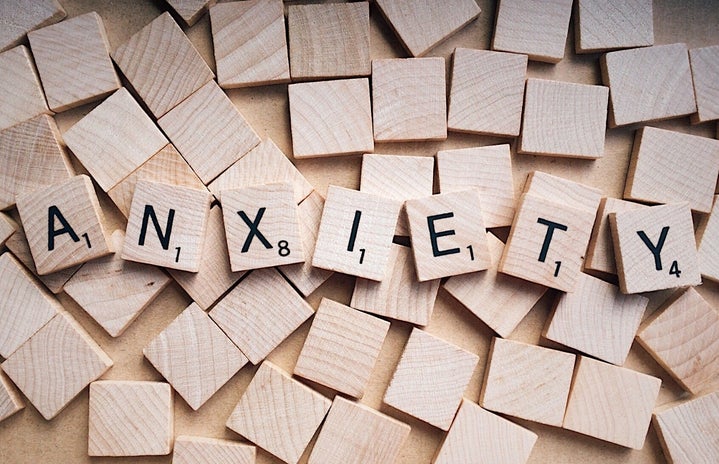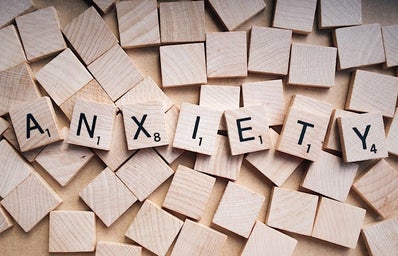It all started with a sidewalk crack. There’s an old home video of me as a toddler being too anxious to cross a small crack in the sidewalk without the help of my parents. These anxious thoughts, mixed with various social interactions during my childhood, turned into the social anxiety that I live with today.
Although my anxiety is still and will continue to be a work in progress, I’ve learned a few things throughout the years that have helped me cope with it. That’s not to say that my experiences are the golden standard of social anxiety, but I think that sharing my knowledge and creating a narrative for mental health is important, now, more than ever. It’s no secret that social anxiety is one of the most common anxiety disorders. Plus, with the isolation and lack of socialization during the pandemic, in addition to COVID, the number of social anxiety cases have also gone up.
So, if you have social anxiety like me or just find yourself feeling more socially anxious during the pandemic, there’s something on this list to help you. Allow me to be your big sister, in a sense, and give you all of the advice and ‘wisdom’ I’ve learned during my 22 years as a socially anxious girl just trying to do her best.
1. No one really cares if you don’t go to the party.
As long as it’s not a birthday or any other major life event, it’s okay to say no to going to a party if you’re feeling too anxious. Putting your own mental health first does not make you a bad person.
2. It doesn’t have to be perfect; it just has to be good enough.
A major part of my anxiety is my perfectionism – I’ve always felt an immense amount of pressure to do everything perfectly. Recently, my dad taught me that schoolwork doesn’t have to be perfect, and sometimes just finishing a project and making it ‘good enough’ is the best you can do.
3. No one pays that much attention to your outfit.
In elementary school, I used to be so stressed about what I was wearing, fearing that everyone would constantly be judging me. However, something I learned through growing up is that no one really cares that much. I realized that I couldn’t even remember what my fellow classmates were wearing the day before.
4. Taking breaks can do wonders.
This can mean study breaks or even a bathroom break during a party to take a breather. Giving your mind that space to relax for even five minutes can be just the thing to calm your anxious thoughts.
5. Talk to your friends about your anxious thoughts, even if you’re embarrassed about them.
Even though it can feel silly sometimes to freak out over the little things, true friends will be there for you and help calm you down no matter what the cause. A few seconds of embarrassment are much better than staying quiet and having a full-on panic attack.
6. If someone rejects you, it isn’t always personal.
I’ve learned this through being a writer, but this can apply to people as well. Sometimes you or your work aren’t the right fit and that doesn’t mean that there is anything wrong with you or it.
7. Prioritize your alone time.
Having time alone, at least for me, is monumental for coping with my social anxiety. Keep in mind that your brain is sensitive to social interactions and that there’s nothing wrong with planning time for yourself where you are free from social responsibilities.
8. Your idea of fun doesn’t have to match everyone else’s
Just because everyone else is drinking and partying doesn’t mean you have to if you don’t want to. Fun can also be a night in alone with a good book or just getting together with a few of your close friends.
9. Listen to music when you are stressed out.
Getting lost in a good song can sometimes be the perfect fix for your nerves. (Anything by Taylor Swift tends to do it for me.)
10. Watch comfort TV shows or read comfort books when you are stressed out.
Focussing on fictional characters’ problems can be a nice escape from your own. Also, never underestimate the power of your favourite comfort character.
11. Don’t rely too much on the person you are dating.
Being in a relationship is one thing, but don’t become too reliant on the person you are just casually seeing to help calm your anxieties. Trust me, it’ll hurt a lot more if you become reliant on someone who may not stay in your life for the long haul.
12. If planning out the details makes you calm, just do it. If other people judge you, it’s their problem.
I always check the parking situation when going to a new place to avoid extra stress. What may seem silly to others, can be essential to your mental well-being, and that’s nothing to be ashamed of. Besides, your friends will be thanking you when you’re the one who found out that the place you are going to requires parking reservations.
13. Try to not focus too much on the past.
A common symptom of social anxiety is over-analyzing social situations after they happen. Although easier said than done, a technique that works for me is viewing my thoughts as a time machine and recognizing if I am in the past, present, or future.
14. Find out your limits and know when to push yourself.
This takes some experimentation, but I would recommend figuring out where your limitations are for socializing. This will help you recognize when you should push yourself to go out and when you should stay home.
15. Telling someone that you can’t support them at a certain moment because your mental health is not great, is a perfectly okay response.
Life happens to everyone and unfortunately, sometimes the downtimes overlap. If you and your friend are both going through a difficult time, it’s perfectly okay for you to say that you can’t fully be there for them if they ask, for example, to talk on the phone. Real friends will understand and wouldn’t want you to sacrifice your mental well-being for theirs.
16. Just because your anxiety isn’t as bad as someone else’s, does not mean it is any less valid.
There can be a shame that comes with complaining about your problems when you know there are others that have it worse. While it is important to remain compassionate and informed, just remember that you are entitled to your own feelings.
17. Your needs are not a burden to those around you.
A common fear for people with social anxiety is that they are being annoying or too demanding. Again, the people in your life who genuinely care about you will not see your needs as irritating and will support you when you need them.
18. Life doesn’t have to have a solid plan; not having everything worked out is okay.
While looking for parking is one thing, make sure to keep in mind that it’s okay to not have everything in your life figured out. As my final year of university comes to an end, I’ve been trying to remind myself of this a lot. As a close friend pointed out to me, life would be boring if it went exactly how you planned.
19. It’s okay to make mistakes and have setbacks.
Hannah Montana said it best: “Nobody’s Perfect”. Remind yourself that you are a human, and it is completely normal and acceptable to make mistakes. Having bad anxiety days is okay and it’s important to be extra kind to yourself during those times.
20. Try not to get too caught up in worse case scenarios.
Although the horrific scenario that your brain has come up with is highly tempting to believe, remember that your anxiety can sometimes blow things out of proportion. One of my favourite grounding techniques is to ask myself, “What if it turns out better than you ever expected?”
21. Recognize that there are some positives that come with your anxiety.
It can be extremely easy to only focus on the negatives of social anxiety, but remember that there are positives too. You triple-check plans and locations to avoid getting lost, you always push yourself to do your best, and you have a certain perspective and compassion for those who also get socially anxious.
22. There is no shame in going to therapy.
Although the stigmas surrounding therapy and mental health are changing, just in case you need to hear it: there is nothing wrong with going to therapy. It has been highly beneficial for me, and I also have various friends who all give raving reviews. You never have to go through your struggles alone and there are many tools out there to help you. For anyone who needs it, I have provided the mental health counselling resources that are available at Western down below.
- Western’s Mental Health Support Website: https://www.uwo.ca/health/psych/index.html
- Western’s Health and Wellness Services: 519-661-3030
While all of these things are easy to list on a page, I know they are easier said than done. Remember that setbacks are all part of the process and allowing yourself to fail can make all of the difference. Also, keep in mind that everyone’s mental health journey looks different, and what works for one person may not work for another. With all that said, I hope that you were able to gain something from this article and that hearing my experiences can help you feel a little less alone.
At the end of the day, the most important thing is prioritizing your mental health and ensuring that you are taking care of yourself. Remind yourself that although social anxiety can be overwhelming sometimes, there are many resources and tactics available to help you out. To all of my fellow socially anxious people out there, I say this wholeheartedly: we’ve got this.


